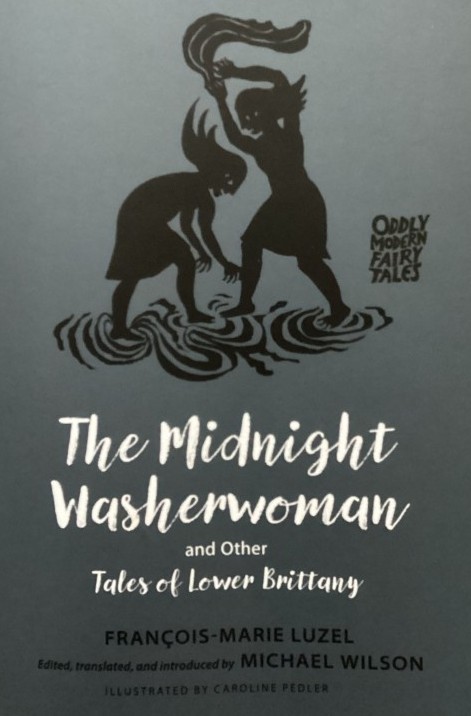Inspiring Older Readers
 posted on 24 Jan 2024
posted on 24 Jan 2024
The Midnight Washerwoman and other tales of Lower Brittany by Francois-Marie Luzel (translated and introduced by Michael Wilson)
For most us, stories come in formats that allow us to constantly revisit them in the medium in which they were originally created. Printed text, film, artworks even digital text can be preserved year after year and passed on to future generations. Interpretations and critical assessments may change but we think of our ever-growing body of stories as in some way concrete and permanent.
But, of course, it hasn’t always been so. In the past many of our songs and stories have been handed down orally and subject to a sort of individual and collective memory. Song writers and storytellers were creating their art for an audience that had limited or no literacy – and the artists themselves may well have had limited skills in reading and writing themselves.
It's also the case that spreading these songs or stories orally was limited by geography. The ability of people to travel was also constrained and so it’s hardly surprising that these collections of oral stories would tend to take on very local characteristics and potential audiences in further flung locations might never hear the rich wisdom of people from (what are now) relatively close neighbourhoods.
The danger that these stories might disappear as generation followed generation was obvious and this has prompted some dogged and bold individuals to do their best to capture these oral gems and set them down on paper (or in recordings) for the rest of us to experience. Francois-Marie Luzel was one of these conservators – a folklorist – who, in the late 19th century set about listening to and writing down the oral stories of his locality in Breton. He personally attended the local ‘veillees’ (storytelling gatherings) and diligently noted down what he was hearing.
Luzel’s stories are now brought to us for the first time by Professor Micheal Wilson from Loughborough University, who is also the Director of the Storytelling Academy. He also provides an informative Preface and Introduction that contextualises and explains the process Luzel undertook and considers the pros and cons of the approach he took.
It's also true, however, that simply writing down a story doesn’t wholly capture the actual storytelling experience. Telling a story is a performance, a small drama, that will be different each time it is told. And, inevitably, the boundaries of the story become flexible and bits drop out and other bits are added. Emphasis and meaning can change and the message the audience takes away can be ever changing. Professor Wilson confronts this head-on:
“I invite the reader, therefore, to look at these neglected stories first and foremost as performance texts, or perhaps improvised theatrical texts, to which I have added some information and thoughts about who performed and collected these particular versions, why and where they were performed, and to what purpose.”
By its nature, the oral tradition will often be ‘closed’ to outsiders because of idiosyncrasies in language use, pronunciation, local dialect etc. So putting down these stories in a way that can be enjoyed by a wider audience is also an act of translation. Again, Wilson is on the case:
“These texts that appear in this volume are translations of translations of transcriptions of oral texts…”
Effectively, Wilson explains, this is a five step process from Luzel witnessing the story, his taking notes, his subsequent ‘good copy’, a translation into French and, finally, Wilson’s translation to English. Phew!
Playfully enough, the stories themselves are presented here in five 'veillee' and can be experienced as if you were at your own storytelling evening. None of the stories are long and each very much feels like a framework that needs to brought to life with the telling and the dramatic actions of the teller – body language is the missing part of all of these tales and you’ll need to imagine that for yourselves.
All the usual subjects are here – ghosts, giants, sexual pranks, the rich and mighty being brought low, rogues who get away with it and rogues who get their comeuppance. These are very much stories of a rural community in which nature is both friend and foe and which needs to be explained by storytelling.
This book will be fascinating for anyone who has an interest in storytelling and the oral tradition and Professor Wilson has done a fine job of making a potentially obscure heritage of stories available and understandable to a modern audience. Published by Princeton University Press, you will be able to order this book from your local independent bookshop or directly from the Princeton University website.
Terry Potter
January 2024